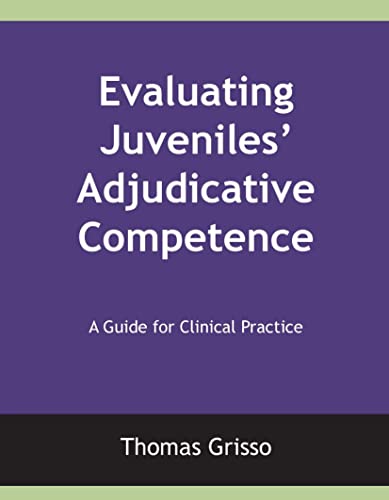Evaluating Juveniles' Adjudicative Competence
A Guide for Clinical Practice
Thomas Grisso
BOOK REVIEW

In the realm of juvenile justice, few topics stir as much controversy and emotion as the adjudicative competence of young offenders. Evaluating Juveniles' Adjudicative Competence: A Guide for Clinical Practice by Thomas Grisso serves as a beacon of clarity in this tumultuous sea, guiding clinicians, legal professionals, and caregivers through the murky waters of competency evaluation. As society grapples with the dual demands of justice and rehabilitation, one question looms large: Are our children truly capable of understanding their legal predicaments?
Grisso, a preeminent figure in forensic psychology, delves into the intricate dynamics between a young person's cognitive abilities, emotional maturity, and legal responsibilities. Through a well-crafted synthesis of empirical research and clinical insights, he challenges professionals to reflect deeply on the very fabric of juvenile justice. Focusing on the psychological frameworks that assess adjudicative competence, the book becomes an essential tool for those involved in legal deliberations concerning minors.
This isn't just a technical manual-it's an urgent call to action. Grisso urges his readers to confront the uncomfortable reality that many juveniles lack the capacity to fully grasp the implications of their actions within the legal system. His compelling arguments are supported by real-world case studies and poignant anecdotes that tug at the very core of human compassion. Can we, as a society, hold children accountable for decisions made in moments of impulsivity when they lack the cognitive tools to fully comprehend the aftermath?
Readers have resonated with Grisso's passionate advocacy for a more nuanced understanding of juvenile offenders. Critics appreciate how the book forces us to reevaluate long-held beliefs about justice and punishment. Amidst the controversies, some have questioned whether Grisso's views lean too heavily on empathy rather than accountability. Still, this only underscores the necessity of dialogue surrounding the complexities of adolescent psychology and the justice system.
Grisso's work transcends academia; it echoes in the courtroom, shaping the strategies of attorneys and advocates who push for informed, compassionate legal practices. As the legal landscape evolves, Grisso's insights prompt us to consider how much constitutional protections should extend to minors. His exploration of competency assessment tools ignites essential conversations about ethical practice, emphasizing that the stakes are not merely theoretical. They involve real children whose futures are being decided in boardrooms and courthouses.
As you navigate the layers of this provocative work, your heart may race with every revelation of systemic failures, of lives hanging in the balance, awaiting a fair shot at redemption. Grisso challenges you not to sidestep these uncomfortable truths but to confront them head-on, understanding that behind the legal jargon are young human beings-some lost, others just needing guidance.
Ultimately, Evaluating Juveniles' Adjudicative Competence is more than a guide-it's a clarion call to reimagine how we see our children in the justice system. The emotional weight of Grisso's arguments compels us to act, to educate ourselves and others, and to advocate for change. Are we prepared to dismantle our preconceived notions and embrace a future where empathy informs justice? This isn't merely a book; it's a movement, a necessary revolution in our understanding and treatment of juvenile offenders. The question remains: will you engage with this critical dialogue? 🌟
📖 Evaluating Juveniles' Adjudicative Competence: A Guide for Clinical Practice
✍ by Thomas Grisso
🧾 172 pages
2005
#evaluating #juveniles #adjudicative #competence #guide #clinical #practice #thomas #grisso #ThomasGrisso